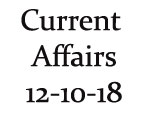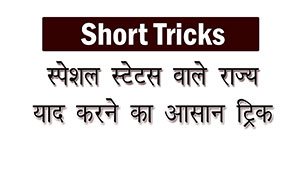-
Current Affairs 12th October 2018
Updated : 12-Oct-2018
Current Affairs 12th October 2018 - Important Points
- Gorkhas in Assam are not ‘foreigners’, clarified by - Home Ministry
- Cabinet approves merger of NCVT, NSDA to form National Council for Vocational Education & Training on - 10th October 2018
- Global Hunger Index 2018 published on - 10th October 2018
- World Bank launched first Human Capital Index on - 11th October 2018
- Malaysian government decides to abolish capital punishment on - 11th October 2018
- Central University of Jammu, ISRO signed MoU to set up Space Applications Center on - 11th October 2018
Current Affairs 12th October 2018 - Details
Gorkhas in Assam are not ‘foreigners’, clarified by - Home Ministry
The Union Ministry of Home Affairs has issued a clarification to the Assam state government regarding the citizenship status of the Gorkha community members living in the state. The clarification follows a representation from the All Assam Gorkha Students’ Union to the Union Home Minister Rajnath Singh after some cases of members of the Gorkha community living in Assam were referred to the Foreigners' Tribunal initially.
Cabinet approves merger of NCVT, NSDA to form National Council for Vocational Education & Training on - 10th October 2018
The Union Cabinet, chaired by the Prime Minister Narendra Modi approved the merger of the National Council for Vocational Training and the National Skill Development Agency to establish the National Council for Vocational Education and Training on 10th October 2018.
Once formed, the NCVET will be regulating the functioning of entities engaged in vocational education and training, both long-term and short-term. It will be establishing minimum standards for the functioning of such entities.
Global Hunger Index 2018 published on - 10th October 2018
As per the 2018 Global Hunger Index (GHI), published on 10th October 2018, the level of hunger and undernutrition worldwide has fallen to 20.9, down from 29.2 in the year 2000. As per the Global Hunger index prepared jointly by global NGOs namely, Concern Worldwide (Ireland) and Welthungerhilfe (Germany), India was ranked 103rd out of 119 qualifying countries.
More about Global Hunger Index
- GHI is a tool designed to comprehensively measure and track hunger at global,national and regional levels.
- GHI scores are calculated each year to assess progress and setbacks in order to curb hunger.
- These scores are calculated using a three-step process.
- Firstly, values are determined for each country in four indicators which are Undernourishment, Child Wasting, Child Stunting and Child Mortality.
- Secondly, each of the four component indicators is granted a standardised score on a 100-point scale based on the highest observed level for the indicator.
- Thirdly, standardised scores are aggregated to calculate the GHI score for each country, with each of the three dimensions (inadequate food supply, child mortality and child malnutrition).
World Bank launched first Human Capital Index, Singapore tops list on - 11th October 2018
The World Bank launched its first Human Capital Index (HCI) on 11th October 2018 in Bali, Indonesia as part of the World Development Report 2019. This index has ranked countries based on their success in developing human capital.
The index ranked 157 countries based on their education and health outcomes and the impact they are having on their productivity. While Singapore tops the rankings whereas African countries occupying the bottom spots.
Important Highlights
- The Human Capital index measures the Index outcomes for each country as a fraction of maximum value of 1.
- It also measures the mortality rate for children below five, early childhood stunting rates due to lack of nutrition and other factors and health outcomes based on the proportion of 15-year-olds who survive until age of 60.
- Further, it measures a country’s educational achievement based on the schooling years a child can expect to obtain by age 18, combined with a country’s relative performance on international student achievement tests.
- Overall, the index found that on an average almost 56 percent of children born today will forego more than half their potential lifetime earnings because governments were not investing adequately on them to ensure their people are healthy, educated and ready for the evolving workplace.
Malaysian government decides to abolish capital punishment on - 11th October 2018
The Malaysian Cabinet on 11th October 2018 decided to abolish the death penalty for all crimes and halt all pending executions. The decision is an extraordinary move against capital punishment in Asia.
The government has taken the decision to scrap capital punishment following strong domestic opposition to the practice. The changes to the laws with capital punishment are expected to be tabled in the Parliament on 15th October.
While applauding the government’s decision, the Malaysian human rights group ‘Lawyers for Liberty’ stated that the death penalty is barbarous, unimaginably cruel and pointless, as it has never been proven todiscourage serious crimes. It further said that once the sentence is scrapped, Malaysia will be having the moral authority to fight for the lives of Malaysians facing death sentences outside Malaysia as well.
Central University of Jammu, ISRO signed MoU to set up Space Applications Center on - 11th October 2018
The Indian Space Research Organisation signed a Memorandum of Understanding (MoU) with the Central University of Jammu (CUJ) to set up of the Satish Dhawan Center for Space Science in the University on 11th October 2018.
During the same occasion, another MoU was also signed between CUJ and the Central Scientific Instruments Organization (CSIR-CSIO).
A two day workshop was also inaugurated at the CUJ campus to raise awareness about space research and to motivate young minds to take up research related to space, geology, astronomy, atmospheric sciences and related fields.














